|
|
|
|
Diy tips to keep your car running
smoothly:
|
| Not many people
consider the maintenance requirements of an automobile. The modern car
is made up of thousands of parts, and the malfunction of just one can
make your car misbehave strangely. Maintaining a car in good condition
will help you to keep it safe, drive it for a long time, and someday
sell it for a better price. |
| The following are
important tips that does not take much time and it would help you keep
your car in good condition. |
|
. |
Tires
Make sure they are properly inflated to the manufacturers specified
pressure. Tire gauges are cheap and easy to use. The first place to look
for the correct air pressure for your specific tires is your vehicle
owner’s manual. Correct air pressure should also be listed on the tire
placard attached to the vehicle door edge, doorpost, glove box door or
fuel door.
Tires should be replaced when tread wear indicators are showing between
the treads. Check your tires every week for pressure and every other
week for wear. Have them replaced when they become worn beyond
acceptable limits.You should also switch
tires depending on the season. Regular
tires are not safe during winter, and winter tires wear very fast during
summer. |
 |
|
. |
Oil
Oil is the blood in your car's vessels,
and if something goes wrong with it, your car isn't going to go very far
not to mention that oil shortage can cause serious damage to your car
engine.While oil manufacturers have
claimed that their oil can last 10,000 miles, it is generally best to
use the same oil for no more than 5000 miles to maximize engine
reliability and efficiency over the long term.
Check the oil regularly, about once a week, and
change the oil or have it changed when you reach the
4000-4500 mile limit or when the oil color
changes to black and loses its viscosity. |
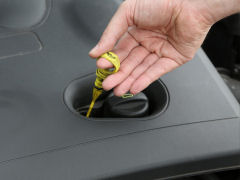 |
|
. |
Windows
Make sure that all windows, mirrors and lights are not broken. Fix or
replace any cracked lights or mirrors as soon as possible. Small
windshield cracks can be repaired before it grows.
Always allow some room when following behind other vehicles that could
throw objects from the road or lose debris from their loads.
Even a small
pebble from the back of a gravel truck can damage your windshield. |
 |
|
. |
Brakes
The braking systems of modern cars are designed to
be maintained periodically to attain maximum efficiency. The brake pads
are a consumable part of your car.
If you notice any problems or misbehavior or even an unusual noise with
your brakes, take your car and have the brakes serviced immediately.
Delaying brakes service would elevate the problem and the maintenance
costs.
If the brakes fail, the consequences can be
very serious.
Make sure your mechanic installs
genuine brake pads.
This is one part that you don't want to save money with. |
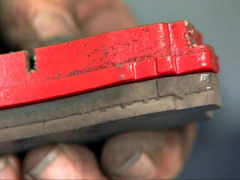 |
|
. |
Battery
Check your car battery
once per month for corrosion
and clean it or have it cleaned as needed. A can of Seven-up can help in
cleaning corroded battery poles.Avoid
running your battery down. Even with
a jump start, it's hard on the battery.
Batteries do eventually get old. A good battery would last between 35-50
months.
You can tell that your battery is dead if your
car does not start in the morning, and when you put on the car
headlights without starting the ignition, the lights are not as bright
and luminous as they should be.
If you must replace your battery, make sure
that your mechanic also checks the
alternator and distributor to make sure
that they are still functioning properly. |
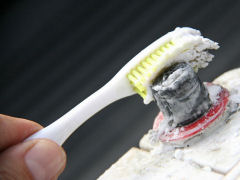 |
|
. |
Fluids
The other life blood of the car are the fluids that the drive train must
have.Coolant, power steering fluid,
transmission fluid, windshield washer fluid, brake fluid, and other
fluids need to be checked
at a minimum of once per week.
Ask your mechanic to demonstrate the method to
check these fluids. Most of the car fluids
are easily accessible from under your hood
and do not require special tools or disassembly of any part.
Car fluids are not expensive but the
lack of any of them in your car can cause serious
and expensive damage. |
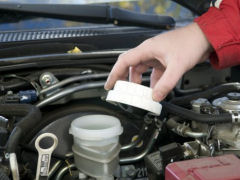 |
|
. |
Lights
You can check your own lights if you have
someplace you can park near reflective glass windows, or you can ask a
friend to walk around your car while you turn on different lights.
Make sure to check
your headlights, taillights, reverse lights, and turn signals.
Notice where your headlights point and correct
it if you know how or have it corrected as needed.
They should be pointing down and towards the
outside of the road, not straight out, up,
or towards the center.
You can see the light pattern on the road ahead
of you. Misaligned headlights can be
distracting or hazardous to drivers ahead of you or in oncoming or
adjacent lanes. |
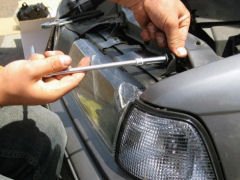 |
|
. |
Wipers
It's not difficult to replace worn windshield wiper blades yourself.
Make sure you replace
the blades once a year before the rainy season.
You can also replace the entire wiper assembly if needed.
If you do a lot of driving in wet weather
conditions, you may also want to apply a
water repellent treatment to your
windshield.
Branded wipers are defiantly worth their cost,
take my word for it, you don't want to experience that your-self on a
rainy day. |
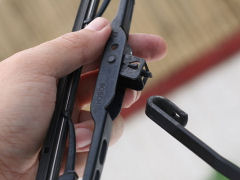 |
| Stay in touch with
your mechanic and ask questions! Mechanics
are used to people asking car related questions,
and most of them handle the questions admirably.
If a mechanic isn't in the mood to give you two
minutes to answer a question, I would suggest looking for another
mechanic to handle your car troubles.
In the trunk (or whatever storage your car has)
it is wise to keep some tools
for checking the various fluids, tires pressure,
and a flashlight specifically for maintenance uses and night problems.
If anything seems out of place, have it checked as soon as possible. An
unusual smell, a new noise, a vibration, a new light on the instrument
panel coming on, anything, have it checked!
As a driver, your responsibility is to
maintain your car to be as safe as possible,
for your sake, the sake of your passengers and the sake of those with
whom you share the road.
Read your automobile owner's manual.
It has lots of information specific to your car.
Track your mileage
and fuel economy. Not only will you learn to save fuel and drive more
moderately, but you will notice if something changes about your fuel
efficiency.
A drop in miles per gallon can signal a maintenance problem.
Track your oil changes
in your mileage log, too. |
|
Two &
Half Mechanics © 2017
 |